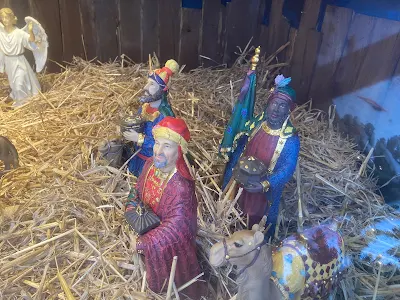 |
July 1974; Sally McKenzie and Pat McCarty walking to
the tent where Krishnamurti gave his talks in Saanen, Switzerland |
 |
From left: Pat McCarty, Sally McKenzie,
and Stephen Morrissey: our last day at Saanen, 5 August 1974 |
Just after arriving in Saanen, Switzerland, where Krishnamurti gave yearly talks, I met Patrick McCarty and Sally McKenzie; it was July 1974. That first evening at the hostel we walked to the Saanen Church to hear a concert; only recently I learned that we had attended an event of the Yehudi Menuhin Festival. Pat McCarty became a good friend. Two years later, in April 1976, we drove from Eureka, where he lived, to Baha California in Mexico; I met his brother and his wife and stayed with them in Oakland; I also met his parents, in Bakersfield. We visited San Diego, San Francisco and Los Angeles, we stayed at Yosemite National Park; we attended Krishnamurti's Talks at Ojai. Pat visited me in Montreal several times, including when I married in August 1976. Then life intervened and we lost touch and then, just a few years ago, I learned Pat had died in 2008.
As well, recently, I learned that Pat's birthday was January 21, 1947, the same birthday as my second wife. I have a theory regarding dates, probably not original to me, it is the synchronicity of dates, the meaningful coincidence of dates, especially births and deaths; dates can be a recognition of the importance of certain events or people important to us. When I met my second wife at Dorval Airport, in 1991, I felt that I had always known her and, looking back, I felt the same way about Pat McCarty; both born on January 21. The meaningful coincidence is their birthdate and that both of these people have helped fulfill my life; these are people who give more than they take.
Lucy Worsley is one of my favourite television personalities, she recently presented the life of Agatha Christie over three evenings. I've read all of Agatha Christie's novels, out loud to my wife, this was a daily time of togetherness made even more enjoyable by what we were reading; unfortunately, when our basement was flooded last summer all of our Agatha Christie novels were destroyed and had to be thrown out, they were all water damaged. Lucy Worsley mentioned that in her old age, when Christie was planning her funeral, she considered having Edward Elgar's Nimrod performed. Nimrod is a deeply moving memorial for Elgar's friend Augustus Jaegar, you can feel Elgar’s grief in this music and feeling his grief we feel our own grief; this music is a deepening of the soul. As well, Nimrod, a city of antiquity in Iraq, was excavated by Christie's husband, the archaeologist Max Malloran, so this music would have a deeper meaning for Christie, she accompanied her husband on this archaeological dig. Nimrod is also a biblical character and it is possible that Nimrod is another name for Gilgamesh, the central character in The Epic of Gilgamesh. I like to tie things together, to see what is significant and what gives meaning to life; The Epic of Gilgamesh deals specifically with the grief of losing a close friend, as Gilgamesh lost Enkidu, as Elgar lost Jaegar, as Max would lose Agatha upon her death, as Agatha would lose Max.
Finally, in addition to Miss Marple and Hercule Poirot, and Sherlock Holmes, one of my favourite detective characters is Colin Dexter's Morse; all of the episodes of this television series with John Thaw are excellent, and the subsequent shows, after Thaws's death, Lewis and Endeavour, are also excellent. An episode of Morse entitled "Dead on Time" features Schubert's String Quintet in C major; like Elgar's Nimrod this is a deeply moving piece of music, it is an entrance way to the soul, to memory and the past, to the ancestors, and to our very existence and history. In the long run it is the soul that concerns us, for we are visitors to this life and our work is the soul’s work, which is to become conscious human beings.








.JPG)
.JPG)
.JPG)
.JPG)
.JPG)
.JPG)
.JPG)
.JPG)
.JPG)
.JPG)
.JPG)
.JPG)
.JPG)
.JPG)
.JPG)
.JPG)
.JPG)
.JPG)
.JPG)
.JPG)
.JPG)
.JPG)
.JPG)


















.JPG)